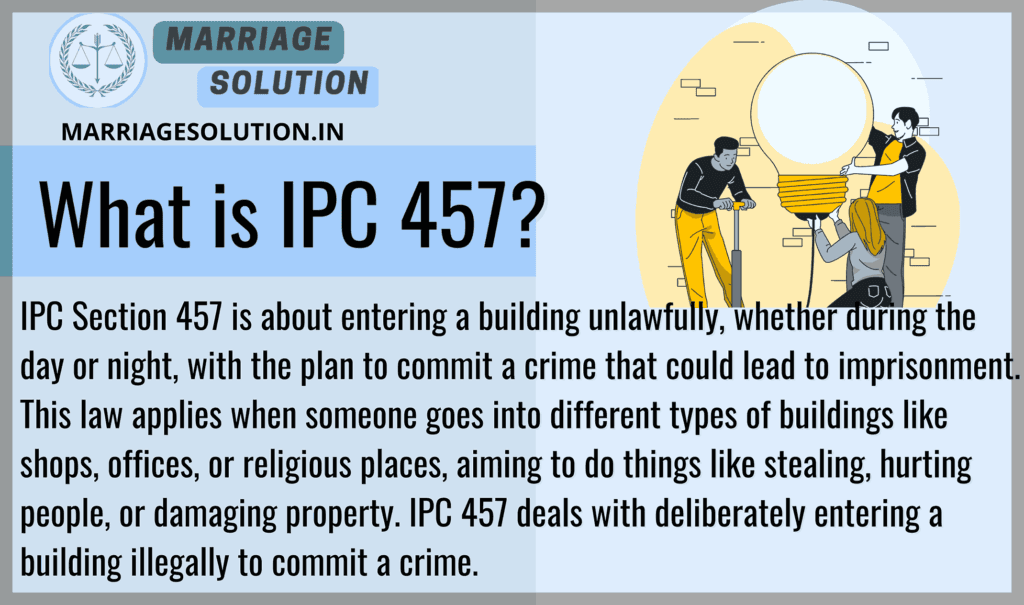Introduction of IPC Section 457
IPC Section 457 is about entering a building unlawfully, either during the day or night, with the intention to commit a crime inside. This law applies to different types of buildings like shops, offices, or religious places. People who enter these places without permission and plan to commit a crime fall under this section of the law
- Introduction of IPC Section 457
- What is IPC Section 457 ?
- IPC Section 457 Overview
- IPC 457 Punishment
- 457 IPC bailable or non bailable ?
- Section 457 IPC in short information
- IPC Section 457 FAQs
- If you need support with court proceedings or any other legal matters, don’t hesitate to reach out for assistance.
What is IPC Section 457 ?
IPC Section 457 is about entering a building unlawfully, whether during the day or night, with the plan to commit a crime that could lead to imprisonment. This law applies when someone goes into different types of buildings like shops, offices, or religious places, aiming to do things like stealing, hurting people, or damaging property. IPC 457 deals with deliberately entering a building illegally to commit a crime.

IPC Section 457 Overview
IPC 457 addresses the act of unlawfully entering a building with the intent to commit an offense. It covers situations where individuals trespass into various types of buildings, such as shops, offices, or religious establishments, with the purpose of committing a crime like theft or vandalism.
2. Beyond Houses Unlike laws that specifically focus on house-trespassing, IPC 457 extends its scope to include a broader range of buildings beyond residential homes. This law recognizes that criminal trespassing can occur in different types of structures, reflecting the diversity of urban and rural environments.
3. Intent is Crucial In IPC 457, the critical element is the intention to commit a crime after entering the building. Mere presence or accidental entry into a building does not violate this law unless there is clear evidence of criminal intent.
4. Examples of Trespassing Examples of activities covered by IPC 457 include lurking or hiding near a bank, jewelry store, or other commercial premises with the intent to commit theft or other offenses. This law also applies to individuals who unlawfully enter places of worship or public buildings with criminal intent.
5. Types of Planned Crimes The planned crimes associated with IPC 457 can vary widely, from theft and vandalism to assault or more serious offenses. The law encompasses any illegal act intended to be carried out after trespassing into a building.
6. Punishment The punishment for violating IPC 457 can involve imprisonment for up to three years, a fine, or both, depending on the severity of the offense and the circumstances of the case. Courts consider factors such as the nature of the planned crime and the defendant’s criminal history when determining the appropriate penalty.
Is IPC 457 Bailable? IPC 457 is generally classified as a bailable offense. This means that individuals accused of committing this offense can seek bail, subject to certain conditions and at the discretion of the court. Bail eligibility may vary based on factors such as the seriousness of the offense and the defendant’s criminal record.
IPC 457 Punishment
- Imprisonment: The punishment for IPC 457 can result in imprisonment for a maximum period of three years.
- Fine: In addition to imprisonment, the offender may also be liable to pay a fine.

457 IPC bailable or not bailable ?
IPC Section 457 is generally considered a bailable offense. This means that individuals accused under this section can typically seek bail, subject to the discretion of the court and based on specific circumstances of the case. However, bail is not an automatic right and may be granted or denied based on the nature of the offense, the individual’s background, and other relevant factors.
Section 457 IPC in short information
| Aspect | Explanation |
|---|---|
| Definition | IPC Section 457 addresses the unlawful entry into a building with the intent to commit a crime. |
| Offense | This law covers various types of buildings beyond houses, including shops, offices, or religious sites. |
| Punishment | Offenders may face imprisonment for up to three years, a fine, or both, depending on the severity of the offense. |
| Bailability | IPC 457 is generally considered a bailable offense, allowing accused individuals to seek bail. |
IPC Section 457 FAQs
What does IPC 457 address?
IPC 457 deals with unlawfully entering buildings like shops or offices with the intention to commit a crime, such as theft or vandalism.
Does IPC 457 cover only house-trespassing?
No, IPC 457 extends beyond house-trespassing to include various types of buildings beyond residential homes.
Why is intent important in IPC 457?
Intent is crucial because simply being in a building is not enough to violate the law; there must be evidence of a planned crime.
Can you give examples of activities covered by IPC 457?
Examples include hiding near a bank to commit theft or entering a place of worship with criminal intentions.
If you need support with court proceedings or any other legal matters, don’t hesitate to reach out for assistance.
Court or any other marriage-related issues, our https://marriagesolution.in/lawyer-help-1/ website may prove helpful. By completing our enquiry form and submitting it online, we can provide customized guidance to navigate through the process effectively. Don’t hesitate to contact us for personalized solutions; we are here to assist you whenever necessary!
